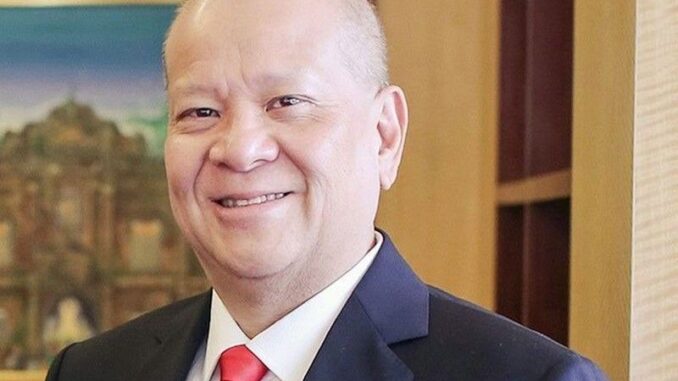
San Miguel Corp. chairman and CEO Ramon S. Ang has vowed to address backlogs affecting two of his three airport projects, concentrating on resolving issues that are delaying the delivery timeline that he has committed to, admitting that with the three airports “sobra na” (It’s too much).
“I will make sure to deliver quality and work,” he told journalists and guests who attended Monday’s EJAP Aviation Forum held at the Makati Diamond Residences.
At present, the SMC Group has three airport projects – the Caticlan International Airport which it took over in 2010 after acquiring majority control over the previous operator, the future Bulacan International Airport which is still in the early stages of construction and the Ninoy Aquino International Airport which his consortium – the New NAIA Infrastructure Corp. (NNIC) – will formally take over tomorrow, Sept. 14.
In a briefing at the start of this week, Ang pointed out that a one year delay in the Bulacan airport project (which has put back the expected completion from 2027 to 2028) has been due to a lack of sand as a filling material for land development and not due to being mabagal (slow).
“We have no control over the material. In fact we are paying a penalty,”he revealed. Under his agreement with the government, failure to meet the agreed timeline is subject to a penalty.
Transportation Secretary Jaime Bautista had previously confirmed to Business Snippets that SMC was facing difficulty sourcing sand due to the surge in demand from several reclamation projects. However, at the time, Bautista was still confident that SMC would strive harder to meet its delivery timeline as it would be subject to a penalty if it missed its committed completion date.
Aside from the government penalty, Ang admitted rising cost as he is also paying his contractor, the Dutch firm Boskalis Westminster N.V., a dredging and heavylift company that provides services relating to the construction and maintenance of maritime infrastructure, “per day, so I don’t want a delay.”
According to the SMC Infrastructure head honcho, “We are asking help from the Department of Transportation and the Department of Environment and Natural Resources to give us a permit to contract for sand to complete our project. We are not mabagal, we are working day and night.”
Ang is hopeful that by December, they will have completed land development work for the terminal concourse.
According to Secretary Bautista, after building the airport and operating it under the 50-year concession agreement with the Philippine government, SMC will secure the title for the Bulacan airport in the name of the Republic of the Philippines which will own the land.
Ang is confident that once the Bulacan airport is completed, it would help decongest Metro Manila, pointing out that the cost of real estate in the area now costs as much as P500,000 per square meter. Relocating to Bulacan, he said, would become more attractive as property in the province cost around P5,000 per sqm.
No real estate play
The SMC CEO assured that his airport development projects do not involve any real estate play or speculation. He pointed out that early on with his first airport, the Caticlan International Airport, his aim was to help the government improve the facility and that he had told the original proponents of the Caticlan airport that they could extend the then existing runway to 2,000 meters even though there was a hill in front.
“Nobody believed it could be done, and yet I proved them wrong,” he recalled.
When he took over the Caticlan airport, he immediately set out to improve and increase the existing passenger capacity of the terminal to 800,000. However, what took time in developing the provincial gateway to the country’s premier beach destination Boracay was the extension of the runway to the current length of 1,800 meters which allowed it to accommodate the much larger jet powered aircraft that could bring in more tourist visitors.
Previously, Caticlan’s short runway length of 950 meters could only accommodate turbo prop engine planes, which likewise could only carry a very limited number of passengers
To do so, Ang said, “SMC bought all the privately owned land. If the government had to buy it, it would have had to deal with Right of Way issues and with the Commission on Audit.”
Additionally, Ang added, “the acquisition cost would have been three to 10 times the value and the government cannot do that.” As such, he admitted, “Caticlan was very hard, but we did it.”
SMC is now about to award the contract for the construction of a new passenger terminal that will be able to accommodate up to seven million passengers and would have eight boarding bridges. Expected completion of the new Caticlan passenger terminal is in three years.
There were also some questions raised about Mr. Ang’s previous proposal to build a bridge from Caticlan to Boracay, which to this day he believes would help decongest the island beach destination as workers could then live in Panay Island which is just nine kilometers away.
Likewise, Ang reiterated, a bridge connection would also resolve Boracay’s garbage problem due to the large population living on the island. Perhaps, Ang’s bridge proposal may now get better government support.
Thus, for the time being, Ang intends to concentrate on his three airport projects and not participate in the other airport projects the DOTr is lining up for development through the public-private partnership route.
SMC, likewise, intends to complete its MRT-7 project which still faces ROW problems. Mr. Ang’s plate is definitely full.


Be the first to comment